School students reach for the stars at Imperial
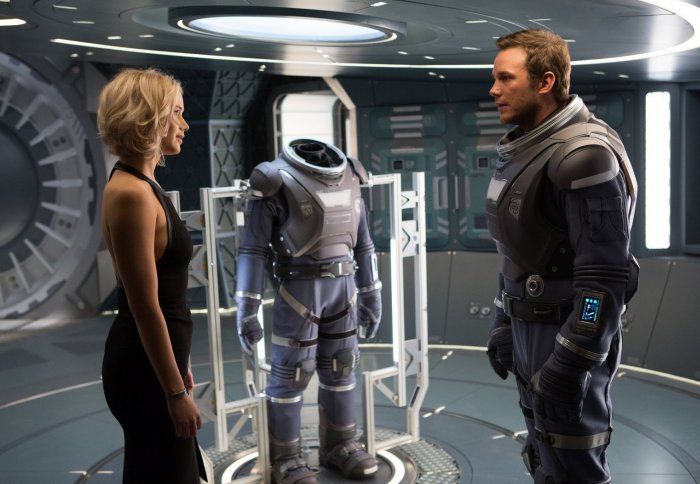
New film Passengers sees Jennifer Lawrence and Chris Pratt travel on a starship similar to those designed by the students.
Sixth form students from across London gathered at Imperial to map out the future of interstellar travel.
In sci-fi film Passengers, released today, Jennifer Lawrence and Chris Pratt awake from an artificial slumber 90 years too early on a starship destined for a new planet far from Earth. But what technologies and design capabilities would humanity need to enable the construction and launch of a ship that could take colonists to planetary systems hundreds of light-years away?
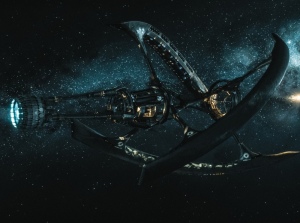
Starship from Passengers
That was the challenge given to school students in Imperial’s Reach Out Lab earlier this month, who were tasked with designing interstellar spacecraft of the future.
The Interstellar Challenge aimed to stimulate original thinking in fields such as maths, physics, engineering, design, biology, economics and sociology. Participants were asked to consider the challenges associated with travel to planets orbiting different stars – including how long the journey would take, how much fuel the ship would need, how a crew could be sustained during the journey and the social and psychological implications of a trip that could span multiple generations. At the end of the day, each team gave a presentation about their proposed approach.
Problem solving
The groups had different ideas about how this might work. Students from Grieg City Academy suggested that they could grow food to sustain passengers through aeroponics – a process of growing plants in an air or mist environment without the need for soil. This would reduce weight and would allow crops to be grown in a much smaller space, they argued.
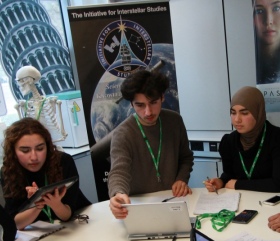 Considering the problems associated with reproduction on board, they suggested that in vitro fertilisation of artificial wombs could be used to ensure the continued population over the course of a flight that could take several hundred years.
Considering the problems associated with reproduction on board, they suggested that in vitro fertilisation of artificial wombs could be used to ensure the continued population over the course of a flight that could take several hundred years.
Students from Coopers School thought that society aboard might need to be organised in a military-like hierarchy, with people trained to obey the orders of their superiors to ensure order on the long trip. West London College, however, thought that a democratic society, which prized freedom of speech, would be the best way to ensure harmony aboard.
Unchartered territory
The winning team, from Featherstone Academy, contained students Avinash Bhatti, Inderpal Rajwancee, Bhavik Narang, Ravi Chhaya, Mani Saini and Fariya Rahman.
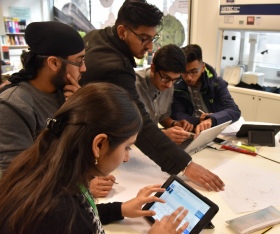 Their ship would consist of large spinning rings, which would mimic the effect of gravity and enable humans to live in a comfortable environment, they explained.
Their ship would consist of large spinning rings, which would mimic the effect of gravity and enable humans to live in a comfortable environment, they explained.
Like the colonists in Passengers, they hypothesised that in the future we may be able to induce hibernation in humans, slowing the aging process and enabling travellers to live for long enough to reach their new home. However, the students suggested that humans would need to be rotated by machine while in suspended animation, to avoid their blood settling.
The health of the colonising population would be critical, they argued. Genetic screening could be used on earth to assess how likely passengers are to develop certain diseases. This could also be used to ensure genetic diversity among the colonising population and avoid issues with reproduction at a later stage.
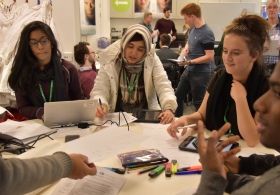 Meal replacements and artificial food such as Soylent could be used to ensure humans on board receive adequate nutrition, they said.
Meal replacements and artificial food such as Soylent could be used to ensure humans on board receive adequate nutrition, they said.
The project, a first for Imperial, was a joint initiative between Imperial, the Initiative for Interstellar Studies, STEM Learning LTD, and the British Interplanetary Society.
Inderpal Rajwancee said: “The experience at Imperial has been fantastic. Problem solving, rather than just learning facts, really helps me to see how what I’m learning in school relates to the real world. There have been so many amazing ideas shown here today – I’ve learnt a lot from other groups who approached the task in a completely different way to us.”
Bhavik Narang added: “I’d definitely put myself forward for a journey into space like this if I had the chance. It’s somewhere totally unexplored that nobody has seen before with their own eyes. Why would I turn that down?”
Article text (excluding photos or graphics) © Imperial College London.
Photos and graphics subject to third party copyright used with permission or © Imperial College London.
Reporter
Deborah Evanson
Communications Division